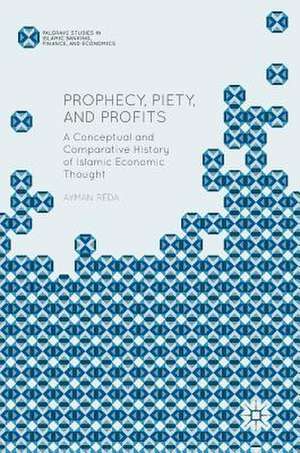Prophecy, Piety, and Profits: A Conceptual and Comparative History of Islamic Economic Thought: Palgrave Studies in Islamic Banking, Finance, and Economics
Autor Ayman Redaen Limba Engleză Hardback – 28 dec 2017
Din seria Palgrave Studies in Islamic Banking, Finance, and Economics
- 18%
 Preț: 774.52 lei
Preț: 774.52 lei - 15%
 Preț: 693.25 lei
Preț: 693.25 lei - 11%
 Preț: 641.75 lei
Preț: 641.75 lei - 15%
 Preț: 642.68 lei
Preț: 642.68 lei -
 Preț: 388.72 lei
Preț: 388.72 lei - 15%
 Preț: 696.35 lei
Preț: 696.35 lei - 18%
 Preț: 786.18 lei
Preț: 786.18 lei -
 Preț: 223.67 lei
Preț: 223.67 lei - 18%
 Preț: 895.89 lei
Preț: 895.89 lei - 18%
 Preț: 899.21 lei
Preț: 899.21 lei - 15%
 Preț: 636.94 lei
Preț: 636.94 lei - 15%
 Preț: 637.25 lei
Preț: 637.25 lei - 15%
 Preț: 641.38 lei
Preț: 641.38 lei - 15%
 Preț: 696.35 lei
Preț: 696.35 lei - 18%
 Preț: 788.22 lei
Preț: 788.22 lei - 15%
 Preț: 640.24 lei
Preț: 640.24 lei
Preț: 648.74 lei
Preț vechi: 763.22 lei
-15% Nou
Puncte Express: 973
Preț estimativ în valută:
124.15€ • 134.81$ • 104.29£
124.15€ • 134.81$ • 104.29£
Carte tipărită la comandă
Livrare economică 22 aprilie-06 mai
Preluare comenzi: 021 569.72.76
Specificații
ISBN-13: 9781137568243
ISBN-10: 1137568240
Pagini: 453
Ilustrații: XIII, 402 p.
Dimensiuni: 148 x 210 mm
Greutate: 0.65 kg
Ediția:1st ed. 2018
Editura: Palgrave Macmillan US
Colecția Palgrave Macmillan
Seria Palgrave Studies in Islamic Banking, Finance, and Economics
Locul publicării:New York, United States
ISBN-10: 1137568240
Pagini: 453
Ilustrații: XIII, 402 p.
Dimensiuni: 148 x 210 mm
Greutate: 0.65 kg
Ediția:1st ed. 2018
Editura: Palgrave Macmillan US
Colecția Palgrave Macmillan
Seria Palgrave Studies in Islamic Banking, Finance, and Economics
Locul publicării:New York, United States
Cuprins
1. Abundance and Scarcity: Introduction.- 2. Abundance and Scarcity: Greek Economic Thought.- 3. Abundance and Scarcity: Christian Economic Thought.- 4. Abundance and Scarcity: Classical Economic Thought.- 5. Abundance and Scarcity: Neoclassical Economic Thought.- 6. Critiques of the Scarcity Paradigm.- 7. Abundance and Scarcity: Islamic Economic Thought.- 8. Wealth and Poverty: Introduction.- 9. Wealth and Poverty: Greek Economic Thought.- 10. Wealth and Poverty: Christian Economic Thought.- 11. Wealth and Poverty: Classical Economic Thought.- 12. Wealth and Poverty: Neoclassical Economic Thought and Its Critics.- 13. Wealth and Poverty: Islamic Economic Thought.- 14. Charity and Usury: Introduction.- 15. Charity: An Intellectual History.- 16. Usury: An Intellectual History.- 17. Charity and Usury: Reunified.- 18. Self-Interest and Rationality: Introduction.- 19. Self-Interest: An Intellectual History.- 20. Self-Interest and Rationality: The Modern Connection.- 21. Islam, Rationality, and Self-Interest.- 22. Utopias and Markets: Introduction.- 23. Utopias.- 24. The Market as Utopia: The ‘Invisible Hand’ Thesis.- 25. Markets in Islam.
Notă biografică
Ayman Reda is a Lecturer at the University of Michigan–Dearborn, USA. He has a PhD in Economics from Michigan State University, and specializes in the history of Islamic economic thought. His professional record includes several articles in internationally recognized journals, conference presentations, invitations to seminars, research grants, and book reviews.
Textul de pe ultima copertă
This book examines, in greater depth than the existing literature, the history of Islamic economic thought. It seeks to introduce Islamic views to debates surrounding critical economic concepts, such as scarcity, wealth, poverty, charity, usury, self-interest, rationality, and markets. It does so through a comparative analysis with the views of Judaic, Christian, and secular economic thought. “Prophecy” is meant to signify the theoretical dimension of religion, while “piety” represents its practical element; neither part is feasible without the other. Together, prophecy and piety inform the Islamic view of economic concepts and phenomena. This view seeks to adjust our approach to profits, both in this world and the next, and seeks to reexamine what is truly profitable and worthy of sacrifice.
Caracteristici
Explores Islamic perspectives on the history of economic concepts and ideas Features comparative analyses of various popular schools of thought Argues that knowledge of both theoretical and practical elements is vital to understanding and explaining economic phenomena
